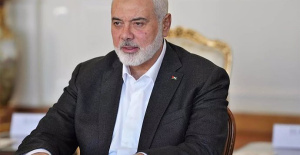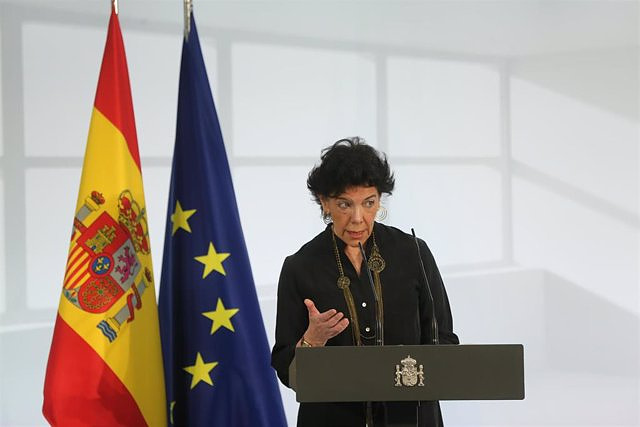He reproaches the "imposition" of an educational model on another also constitutional but not to the "liking" of the legislator
MADRID, 26 Abr. (EUROPA PRESS) -
The four magistrates that make up the conservative minority of the Constitutional Court (TC) have warned that the so-called 'Celaá law reduces "to nothing" what they consider "essential content" of the right to education by prohibiting it from being financed with public money to the centers that segregate students by sex, in a private vote where they distance themselves from the endorsement given by the progressive majority to this norm.
The magistrates Ricardo Enríquez, Enrique Arnaldo, César Tolosa and Concepción Espejel sign a vote, to which Europa Press has had access, where they defend that the Education Law endorsed on April 18 by the Plenary of the Constitutional Court should have been declared unconstitutional for three precepts Specifically, those referring to public aid to subsidized centers, the schooling of students with special needs and religion as a subject.
The signatories focus on "the legislator's decision not to 'help' perfectly constitutional educational models or systems, such as single-sex education, (...) but that are simply not to their liking".
They agree with their colleagues that article 27.9 of the Constitution, according to which "the public powers will help educational centers that meet the requirements established by law", "does not derive a subjective right to public provision", reasoning that, "If that were the case, the result would be that the system of the so-called 'school check' would have been constitutionalized in 1978."
For the four magistrates, the sentence approved redirects said precept of the Magna Carta "to the will of the legislator with no more limit than the reasonableness of the unequal treatment", which in their opinion is "an interpretation of the Constitution that ends up reducing one of his articles to nothing".
In his opinion, it is an interpretation "especially forbidden when it is also a precept, article 27, which was the result of a delicate agreement that almost derailed the constituent process in 1978 and which was included among the 'fundamental rights and public liberties ' ultra-reinforced protection ".
"One can agree or disagree with this article 27.9, or think that Spanish society has evolved and is very different from then, so that that precept no longer makes sense. But that assessment does not correspond to the Constitutional Court" , they underline.
Thus, they believe that in said interpretation "the limit of the 'essential content' of article 27.9 was applicable" in order to "prevent that the freedom held by the social majority to configure the educational system (...) does not become the faculty of undermining educational pluralism by imposing the model that is preferable to them by the simple expedient of suppressing all 'support' to alternative models that are not to their liking".
"Only in this way educational pluralism, whose practical expression is the freedom to choose an educational model different from the one preferred by the majority, can it be 'real and effective'", they defend.
Otherwise, and taking into account that this public aid "especially concerns families with less economic capacity", they ask "how is educational pluralism protected if the right of the majority to deprive the models of all aid is admitted?" that, even constitutional, do you consider bad or inconvenient?
"The interpretation of article 27.9 that we propose is simply that of the neutrality of the 'aid' provided for in it, precisely for the sake of the 'educational and political pluralism' that justify this precept and give it life, as 'essential content'", they settle .
They also criticize that the sentence supports the article of the 'Celaá law' that imposes as criteria to decide how the schooling of students with special needs is to be carried out, the best interest of the minor but also "the will of the families that show their preference by the most inclusive regime", that is, in ordinary educational centers.
The dissenting magistrates warn that "the simple incorporation of students who present special educational needs to ordinary educational centers, as stated in the sentence, cannot be considered inclusion", since this "requires the realization in the centers of the necessary adjustments that guarantee these students an environment in which it is ensured that the relationship with others will be positive and contributes to their integration into society".
They understand that by prioritizing the will of these families, the others are ignored, which --they indicate-- "may end up causing significant disturbances in the practical application of the precept by devaluing the only criterion to be taken into account in these cases, which is the to detect and impose the defense of the best interests of the minor concerned, regardless of the will of their parents, their sense, or the need for 'very specialized' care or of another type".
The third fault that they make to the 'Celaá law' is the absence of mention of religion as a subject in the educational curriculum, considering that it leaves "in question" the possibility that churches, denominations, and religious communities "can react against to possible acts of the educational public administrations contrary to the right of those to define the religious creed object of constitutionally recognized teaching".
They also criticize that, in this regard, the Constitutional Court carries out "a covert change of doctrine", recalling that "our doctrine unequivocally inferred, at least until now, the constitutional right of churches, denominations and religious communities to define and disseminate the religious creed that is the object of teaching".

 Exploring Cardano: Inner Workings and Advantages of this Cryptocurrency
Exploring Cardano: Inner Workings and Advantages of this Cryptocurrency Seville.- Economy.- Innova.- STSA inaugurates its new painting and sealing hangar in San Pablo, for 18 million
Seville.- Economy.- Innova.- STSA inaugurates its new painting and sealing hangar in San Pablo, for 18 million Innova.- More than 300 volunteers join the Andalucía Compromiso Digital network in one month to facilitate access to ICT
Innova.- More than 300 volunteers join the Andalucía Compromiso Digital network in one month to facilitate access to ICT Innova.-AMP.- Ayesa acquires 51% of Sadiel, which will create new technological engineering products and expand markets
Innova.-AMP.- Ayesa acquires 51% of Sadiel, which will create new technological engineering products and expand markets Hamas views Israel's latest deal proposal in "positive spirit"
Hamas views Israel's latest deal proposal in "positive spirit" The Ibex 35 rises 0.22% mid-session driven by Aena (4.66) and Sabadell (4.57%)
The Ibex 35 rises 0.22% mid-session driven by Aena (4.66) and Sabadell (4.57%) STATEMENT: Selena Romero and Roberto Pérez winners of the 22nd Nacho Juncosa Memorial - International under-16 tennis tournament
STATEMENT: Selena Romero and Roberto Pérez winners of the 22nd Nacho Juncosa Memorial - International under-16 tennis tournament STATEMENT: DH2 Energy is the winner in the first European renewable hydrogen auction
STATEMENT: DH2 Energy is the winner in the first European renewable hydrogen auction How Blockchain in being used to shape the future
How Blockchain in being used to shape the future Not just BTC and ETH: Here Are Some More Interesting Coins Worth Focusing on
Not just BTC and ETH: Here Are Some More Interesting Coins Worth Focusing on UPV students design an app that helps improve the ventilation of homes in the face of high temperatures
UPV students design an app that helps improve the ventilation of homes in the face of high temperatures Ivace and promotes a less invasive device for the early detection of prostate cancer
Ivace and promotes a less invasive device for the early detection of prostate cancer Valencia unanimously approves the ordinance to allocate spaces to test innovative initiatives
Valencia unanimously approves the ordinance to allocate spaces to test innovative initiatives UPV researchers promote a paid master's degree as a "talent factory" in integrated photonics
UPV researchers promote a paid master's degree as a "talent factory" in integrated photonics A million people demonstrate in France against Macron's pension reform
A million people demonstrate in France against Macron's pension reform Russia launches several missiles against "critical infrastructure" in the city of Zaporizhia
Russia launches several missiles against "critical infrastructure" in the city of Zaporizhia A "procession" remembers the dead of the Calabria shipwreck as bodies continue to wash up on the shore
A "procession" remembers the dead of the Calabria shipwreck as bodies continue to wash up on the shore Prison sentences handed down for three prominent Hong Kong pro-democracy activists
Prison sentences handed down for three prominent Hong Kong pro-democracy activists ETH continues to leave trading platforms, Ethereum balance on exchanges lowest in 3 years
ETH continues to leave trading platforms, Ethereum balance on exchanges lowest in 3 years Investors invest $450 million in Consensys, Ethereum incubator now valued at $7 billion
Investors invest $450 million in Consensys, Ethereum incubator now valued at $7 billion Alchemy Integrates Ethereum L2 Product Starknet to Enhance Web3 Scalability at a Price 100x Lower Than L1 Fees
Alchemy Integrates Ethereum L2 Product Starknet to Enhance Web3 Scalability at a Price 100x Lower Than L1 Fees Mining Report: Bitcoin's Electricity Consumption Declines by 25% in Q1 2022
Mining Report: Bitcoin's Electricity Consumption Declines by 25% in Q1 2022 Oil-to-Bitcoin Mining Firm Crusoe Energy Systems Raised $505 Million
Oil-to-Bitcoin Mining Firm Crusoe Energy Systems Raised $505 Million Microbt reveals the latest Bitcoin mining rigs -- Machines produce up to 126 TH/s with custom 5nm chip design
Microbt reveals the latest Bitcoin mining rigs -- Machines produce up to 126 TH/s with custom 5nm chip design Bitcoin's Mining Difficulty Hits a Lifetime High, With More Than 90% of BTC Supply Issued
Bitcoin's Mining Difficulty Hits a Lifetime High, With More Than 90% of BTC Supply Issued The Biggest Movers are Near, EOS, and RUNE during Friday's Selloff
The Biggest Movers are Near, EOS, and RUNE during Friday's Selloff Global Markets Spooked by a Hawkish Fed and Covid, Stocks and Crypto Gain After Musk Buys Twitter
Global Markets Spooked by a Hawkish Fed and Covid, Stocks and Crypto Gain After Musk Buys Twitter Bitso to offset carbon emissions from the Trading Platform's ERC20, ETH, and BTC Transactions
Bitso to offset carbon emissions from the Trading Platform's ERC20, ETH, and BTC Transactions Draftkings Announces 2022 College Hoops NFT Selection for March Madness
Draftkings Announces 2022 College Hoops NFT Selection for March Madness























